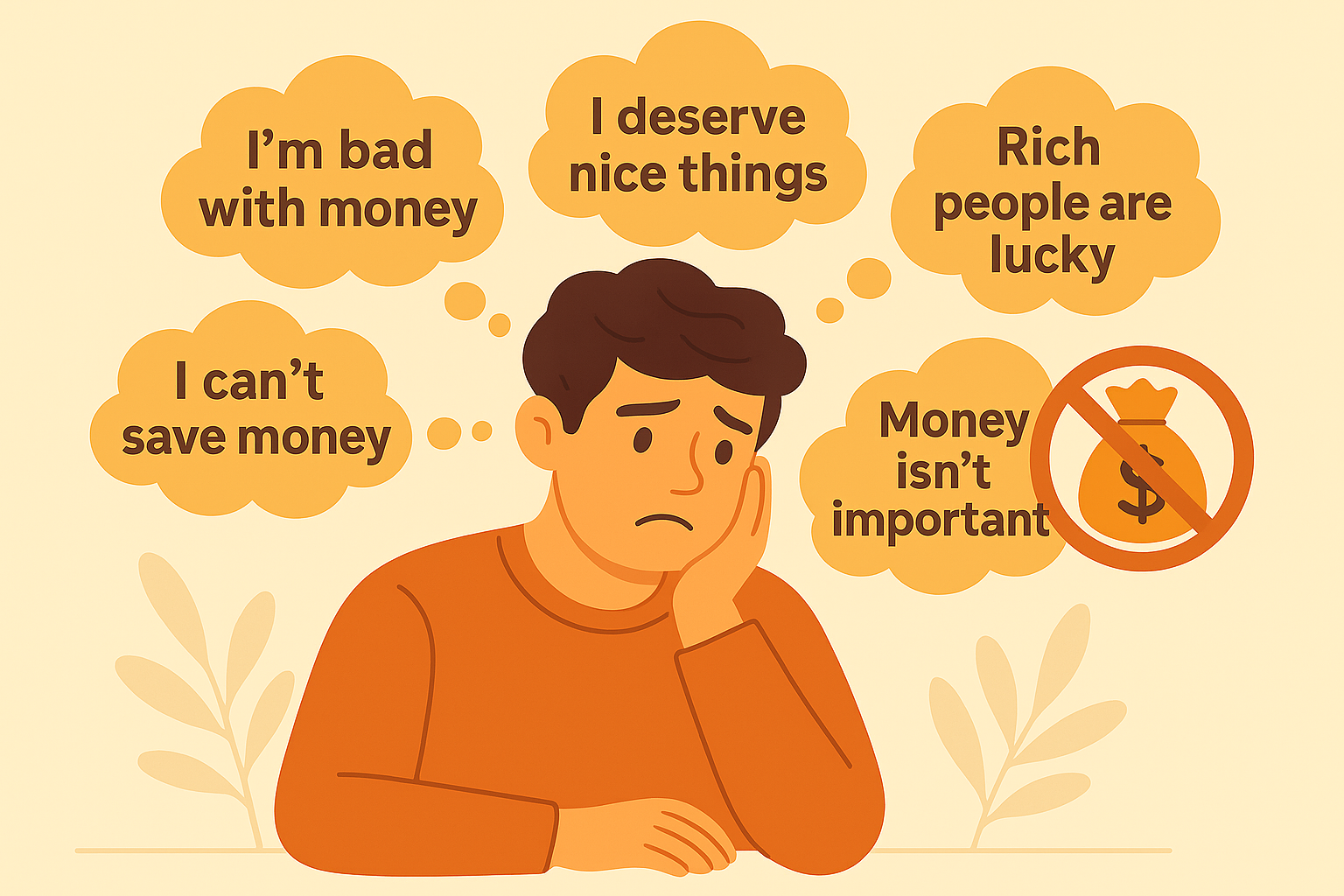Congratulations on landing your first real job and seeing that beautiful direct deposit hit your account! But before you start planning your celebration shopping spree, let’s talk about the critical money mistakes to avoid in your 20s that could save you thousands of dollars and years of financial stress.
If you’re in your 20s and new to this whole “having a real paycheck” thing, you’re probably about to make at least one (or all five) of these costly money mistakes to avoid that derail young adults’ financial futures. The good news? Once you know what these mistakes are, you can avoid them completely and actually start building wealth while your friends are still wondering where their money went.
In the next few minutes, you’ll discover the five biggest money mistakes to avoid in your 20s, plus the simple strategies that can set you up for life. No complicated financial advisor talk, no boring spreadsheets – just real advice for people who are figuring out adulting one paycheck at a time.
Here’s the truth: your 20s are either going to set you up for financial freedom or financial stress for the next decade. Avoiding these money mistakes to avoid in your 20s is the choice that changes everything, and it starts with recognizing these critical patterns that keep young adults broke…
Money Mistake #1: Not Starting a Budget Early
Picture this: you just got your first job making $45,000 a year. After years of ramen noodles and borrowed money, you finally have REAL income. So naturally, you celebrate by upgrading everything – new apartment, new clothes, daily Starbucks runs, weekend brunches, and those cute home decor items from Target.
Three weeks later, you’re checking your account wondering how you only have $127 left when you just got paid $1,500 after taxes.
Without a budget, money disappears faster than free pizza at a college event. You’re basically playing financial whack-a-mole – money comes in, expenses pop up everywhere, and you’re constantly swinging blindly hoping to hit something.
The good news is there’s a dead-simple fix that takes about 5 minutes to set up. Start with the 50/30/20 rule. Put 50% toward needs (rent, groceries, utilities), 30% toward wants (eating out, entertainment, shopping), and 20% toward savings and debt payments.
Use a beginner-friendly app like Mint or even just your bank’s spending tracker. The goal isn’t to restrict every dollar – it’s to make sure you’re not accidentally spending your rent money on clothes you’ll wear twice.
Check your budget weekly (not monthly) when you’re starting out. You’re building a new habit, and weekly check-ins help you course-correct before you blow your entire paycheck on impulse purchases.
Once you see that you spent $340 on “miscellaneous” last month, you’ll naturally start making better choices. Speaking of choices that feel good in the moment but hurt later…
Money Mistake #2: Splurging to Match Your Peers
This one hits hard because you DO deserve nice things! You worked hard in college, landed a job, and you’re finally earning real money. Your Instagram feed is full of friends with designer bags, expensive dinners, and weekend getaways. Your coworkers grab $15 salads for lunch every day like it’s nothing.
So you start thinking: “I make good money now, I can afford this.” Before you know it, you’re financing a car that costs $400/month, living in an apartment that eats up 40% of your income, and putting weekend trips on credit cards because “you only live once.”
Lifestyle inflation happens faster than your income grows. You might get a $45,000 job, but after taxes, you’re taking home about $35,000. That’s $2,900 per month. If you’re spending like you make $45,000, you’re already in trouble.
The solution isn’t to live like a monk, but to be intentional about your choices. Before any purchase over $100, ask yourself: “Am I buying this because I need it, or because I want to feel like I’m successful?”
Try the 24-hour rule for everything non-essential. You’d be shocked how many “must-have” items you completely forget about after sleeping on it. Also, calculate the true cost of monthly payments – that $400 car payment is $4,800 per year of your after-tax income. Is that car really worth 14% of your entire take-home pay?
Set a realistic “fun money” budget each month and stick to it. Maybe it’s $200 for dining out and entertainment. When it’s gone, you’re done until next month. This way you can still enjoy your 20s without sabotaging your financial future. Understanding these money mistakes to avoid in your 20s now prevents expensive lifestyle inflation later…
Money Mistake #3: Ignoring Student Loans or Credit Card Debt
Let’s be real – you probably graduated with student loans. Maybe it’s $25,000, maybe it’s $60,000, or maybe you’re one of those unlucky souls staring at six figures. Either way, you’re not alone, and pretending they don’t exist won’t make them disappear.
Many new grads make minimum payments and hope for loan forgiveness that may never come. Meanwhile, that $35,000 in student loans at 6% interest costs you $175 per month in interest alone. Every month you pay just the minimum, you’re basically lighting money on fire.
Student loan interest is like a financial anchor. Even “low” interest rates of 4-6% mean hundreds of dollars per year that can’t go toward building your future. Plus, high student loan payments can prevent you from qualifying for a mortgage later.
The first step to freedom is facing the reality of what you owe. Log into your loan servicer website and write down each loan balance, interest rate, and minimum payment. Log into your loan servicer website and write down each loan balance, interest rate, and minimum payment. Yes, it’s scary, but you can’t fight what you don’t acknowledge.
If you have multiple loans, use the debt avalanche method – pay minimums on everything, then attack the highest interest rate first. Usually, this means prioritizing private loans over federal loans.
Even an extra $50 per month makes a huge difference. On a $30,000 loan at 6% interest, paying an extra $50 monthly saves you over $8,000 in interest and cuts your repayment time by 5 years.
For federal loans, look into income-driven repayment plans if you’re struggling, but remember these often increase your total interest paid over time. The goal is to pay them off as quickly as you reasonably can…
Money Mistake #4: Not Saving for the Future
“I’ll start saving when I make more money.” “I’m only 23, I have plenty of time to save for retirement.” “I can barely afford my expenses now, how can I save?”
This thinking costs twenty-somethings hundreds of thousands of dollars in potential wealth. While your friends are spending every dollar they make, you could be quietly building a fortune through the magic of compound interest.
Every year you delay saving costs you exponentially more later. Money invested in your 20s has 40+ years to grow. Money invested in your 30s only has 30+ years. That 10-year difference could mean the difference between retiring comfortably and working until you’re 75.
But you don’t need hundreds of dollars to start. Begin with just $25 per week automatically transferred to a high-yield savings account. That’s $1,300 per year, which is enough to handle most minor emergencies without touching a credit card.
If your job offers a 401(k) with company matching, contribute enough to get the full match immediately. This is literally free money. If they match 50% of your contributions up to 6% of your salary, and you make $45,000, that’s $1,350 in free money per year.
Don’t have a 401(k)? Open a Roth IRA with Vanguard or Fidelity and invest in a target-date fund. Start with $50 per month if that’s all you can afford. Here’s the magic: $50 per month invested from age 25 to 65 at 7% returns becomes over $131,000. Wait until 35 to start, and you only get about $61,000.
The key is starting, even if it’s small. You can always increase contributions as your income grows…
Money Mistake #5: Not Learning About Money
Nobody taught you this stuff in school, right? You learned calculus and the periodic table, but somehow graduated without knowing how credit scores work, what a Roth IRA is, or why everyone says compound interest is so amazing.
So you’re making financial decisions based on guesswork, friend advice, or whatever sounds good on TikTok. You keep your money in a checking account earning 0% while inflation eats away at your purchasing power. You don’t understand tax brackets, so you’re scared to ask for a raise. You fall for “investment opportunities” that sound too good to be true because you don’t know what normal returns look like.
When you don’t understand how money works, you make expensive mistakes. You miss out on tax advantages, pay unnecessary fees, and make investment decisions based on fear instead of facts.
Fortunately, learning about money doesn’t have to be boring or overwhelming. Start with resources made for your generation. YouTube channels like “The Financial Diet” and “Two Cents” explain money concepts in actually entertaining ways.
Read “I Will Teach You to Be Rich” by Ramit Sethi – it’s written specifically for young adults and covers everything from budgeting to investing without being boring.
Set specific financial goals like “I want to save $2,000 for an emergency fund by my next birthday.” Having clear targets makes it easier to stay motivated when your friends are blowing money on things you’re trying to avoid.
The more you learn now, the more confident you’ll become with money decisions. And confidence leads to better choices, which leads to more wealth.
The Real Secret: Your 20s Are Your Financial Superpower Years
Here’s what successful people know that broke people don’t: your 20s are the most powerful wealth-building decade of your life. Not because you make the most money (you probably don’t), but because you have the most time for compound interest to work its magic.
Every dollar you save and invest in your 20s is worth way more than dollars saved in your 30s or 40s. Time literally multiplies your money, but only if you start now.
Start Small, Start Today
Pick one and start today: Choose the mistake that resonates most and fix it this week. Maybe download a budgeting app, set up automatic savings, or finally log into your student loan account to see what you owe.
Small changes in your 20s create massive differences in your 30s and beyond. While your friends are stressing about money, you’ll be building wealth and buying your freedom one paycheck at a time.
Your future financially free self is counting on the decisions you make right now. What’s it going to be?
Which of these money mistakes to avoid in your 20s hit closest to home? Drop a comment below – let’s help each other avoid the financial traps that keep twenty-somethings broke!






